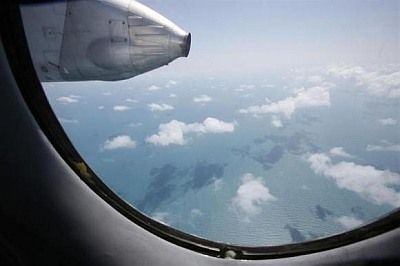 The search for the crashed Malaysian jet continued on Sunday with 10 aircraft and eight ships tasked to scour the Indian Ocean, after early sightings in the new search zone drew a blank.
The search for the crashed Malaysian jet continued on Sunday with 10 aircraft and eight ships tasked to scour the Indian Ocean, after early sightings in the new search zone drew a blank.
Eight planes and a number of ships scoured some 252,000 square kilometres of water yesterday for signs of the plane, with aircraft reporting sightings of objects similar to those reported on Friday, the Australian Maritime Safety Authority (AMSA) said.
A Chinese and an Australian ship failed to identify debris from the missing Malaysia Airlines Flight MH370 after their first day in the new search area about 1,850 km west of Perth.
Chinese patrol ship Haixun 01 and Australia's HMAS Success both retrieved objects but none was confirmed to be from flight MH370 that went missing over three weeks ago, Australia's maritime authority said.
Former Australian defence force chief Angus Houston would head a new unit to help in the search involving the militaries of seven nations -- Australia, China, Malaysia, Japan, New Zealand, South Korea and the US.
Houston would lead the new Joint Agency Coordination Centre (JACC) based in Perth, "to coordinate the Australian government's support for the search into MH370," Prime Minister Tony Abbott said.
Ten planes will fly over 319,000 square kilometres, the AMSA said.
Weather in the search area is forecast to worsen with light showers and low clouds, though search operations are expected to continue, the authority said.
Eight ships will join the search by the end of the day, including the Australian Ocean Shield, which will be fitted with a "black box" detector and an autonomous underwater vehicle, AMSA said.
All ships will seek to locate and identify objects sighted by aircraft over the past two days.
Aircraft involved in the hunt for the plane have so far reported seeing a number of objects of various colours floating in the sea in the new area.
A Chinese aircraft on Saturday spotted three unidentified floating objects coloured white, red and orange. White and red were among the colours on the outside of the missing plane.
Officials said the focus to the new area about 1,100 km northeast of the previous search zone changed after radar data showed the plane had been travelling faster that previously thought, thus burning more fuel.
The Beijing-bound jetliner -- carrying 239 people, including five Indians, an Indo-Canadian and 154 Chinese nationals -- had vanished after taking off from Kuala Lumpur and crashed in the remote southern Indian Ocean.










